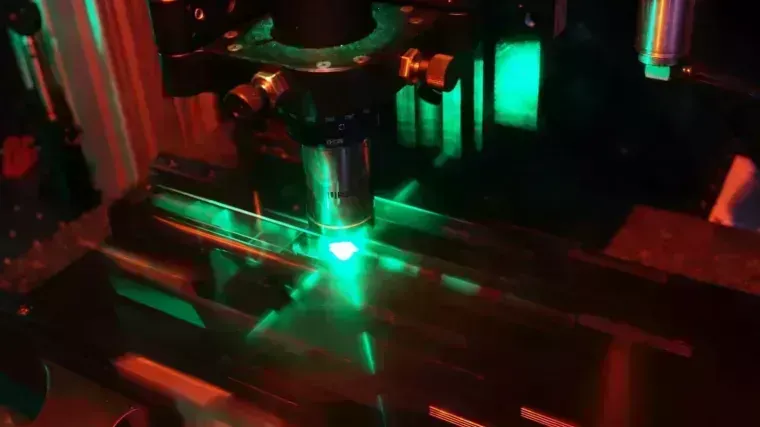
- Light
Published: | By: Ira Winkler/Ute Schönfelder, English translation by Gleb Chupakhin
Source article
The Federal Ministry of Education and Research (BMBF) is supporting an interdisciplinary Thuringian alliance for the development and application of high-tech ultrashort pulse lasers. The alliance is comprised of the Friedrich Schiller University Jena and the Ernst Abbe University of Applied Sciences Jena along with 14 companies in optical and photonics technology and seven other associated partners. Over the next three years, approximately 13 million euros will be allocated to the Jena location from the "RUBIN - Regional Entrepreneurial Alliances for Innovation" program. An additional 7 million euros will be contributed by the stakeholders.
The alliance is called "UKPiño" and places the ultrashort pulse laser (German abbreviation: “UKP”) technology at the center of its activities. "The fascinating aspect of this technology is that it is a contactless processing method that is not only highly precise, but also efficient and low-maintenance. This enables the production of products that meet the highest quality requirements, especially in terms of durability," explains ACP principal scientist Prof. Dr. Stefan Nolte of the University of Jena. His research group has been successfully working with UKP lasers in material processing for years and was awarded the German Future Prize ("Deutscher Zukunftspreis") for their achievements already in 2013.
Ultrashort pulse lasers operate with pulses in the femtosecond range, allowing for the processing of various materials, particularly metals, glass, semiconductors, and tissues. A femtosecond corresponds to one quadrillionth of a second; In that timeframe, light can travel a mere 0.3 micrometers, which is about one hundredth of the thickness of a human hair.
"UKPiño" focuses on the development and application of lasers that operate in the near-infrared spectrum, specifically in the 2-µm wavelength range. Because many high-tech materials such as silicon, ceramics, crystals, high-performance plastics, and composite materials are transparent to radiation in this spectral range, the laser radiation can be focused through the front side, enabling processing within the volume of the material or on the backside without damaging the surface.
Dr. Tino Eidam, the coordinator of the alliance, outlines the potential of the concept: "UKPiño is entering highly dynamic fields characterized by stable and disproportionate growth rates." With this new technology, it is possible to design silicon semiconductor structures that enable the integration of electronics and photonics on a chip (known as "silicon photonics"). "We see further application areas in medical technology, battery manufacturing, ‘Smart Wearables’, and additive manufacturing as well as scientific laser systems, quantum technology, and nonlinear frequency conversion to the soft X-ray range, which can open up novel metrological applications, for example."
The UKPiño consortium emerged from the research group "UKPflex," which was supported by the Thuringian Ministry of Economic Affairs. From 2018 to 2020, UKPflex consolidated funding from state, federal, and EU sources.
Contact
07745 Jena Google Maps site planExternal link